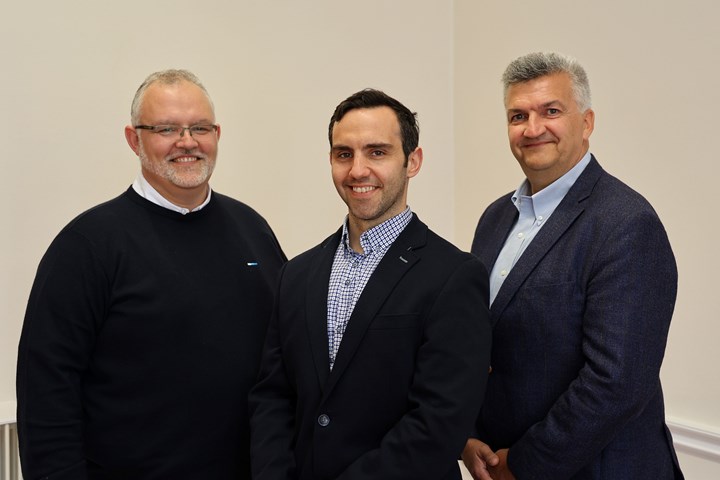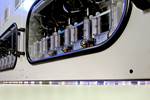PlasmaBound closes €2.35 million funding round on controlled polymer ablation technology
PlasmaBound’s aims to accelerate its high-speed composite bonding technology to make sustainable composites a standard feature on vehicles, devices and structures on a global scale.

Pictured left to right at NovaUCD are PlasmaBound co-founders, Alan Barry, Dr. James Nicholas Barry and Xavier Montibert. Photo Credit: Nick Bradshaw, Fotonic
(Dubin, Ireland), a University College Dublin (UCD) spin-out, and a company that pretreats fiber-reinforced composites, announced on May 1 the completion of a €2.35 million ($2.46 million) funding round, led by Dublin-based Act Venture Capital, and supported by the Atlantic Bridge University Fund, Enterprise Ireland and a number of private investors. The funding will permit rapid acceleration on the path toward enabling its vision of sustainable lightweight materials being a standard feature on vehicles, devices and structures, globally, without the complexity, cost and waste involved.
PlasmaBound’s controlled polymer ablation (CPA) technology is said to be attracting interest in several sectors, where it empowers global industry to achieve their sustainability goals, particularly in carbon reduction and battery range extension. The technology is deployed in a software as a service (SaaS) model, with term-based licensing.
CPA enables high-speed bonding of ultra-lightweight composite materials in a manner where it will effectively take on a role similar to welding in metals. PlasmaBound says this will collapse operational cycle times, extend shelf life and reduce manufacturing waste streams, all while improving ultimate bond strengths.
“Our technology is about getting more renewable, lightweight materials into use faster as we seek a more sustainable carbon-reduced future,” Alan Barry, CEO, PlasmaBound, contends. “We are excited to continue our rapidly accelerating journey toward enabling these materials to be standard on vehicles, structures and devices. Right now, this is limited by cost and complexity to only high-tech applications, or premium price points, with limited real environmental impact. Pushing recyclable composites into mainstream mass-production will move the dial on all our efforts for a sustainable tomorrow. This funding signals confidence in this opportunity.”
PlasmaBound, headquartered at NovaUCD, was co-founded in 2017 by Dr. James Nicholas Barry, Alan Barry and Xavier Montibert as a spin-out from the UCD College of Engineering and Architecture following the completion of Enterprise Ireland Commercialisation Funding.
Related Content
-
Active core molding: A new way to make composite parts
Koridion expandable material is combined with induction-heated molds to make high-quality, complex-shaped parts in minutes with 40% less material and 90% less energy, unlocking new possibilities in design and production.
-
Plant tour: Airbus, Illescas, Spain
Airbus’ Illescas facility, featuring highly automated composites processes for the A350 lower wing cover and one-piece Section 19 fuselage barrels, works toward production ramp-ups and next-generation aircraft.
-
Reinforcing hollow, 3D printed parts with continuous fiber composites
Spanish startup Reinforce3D’s continuous fiber injection process (CFIP) involves injection of fibers and liquid resin into hollow parts made from any material. Potential applications include sporting goods, aerospace and automotive components, and more.






